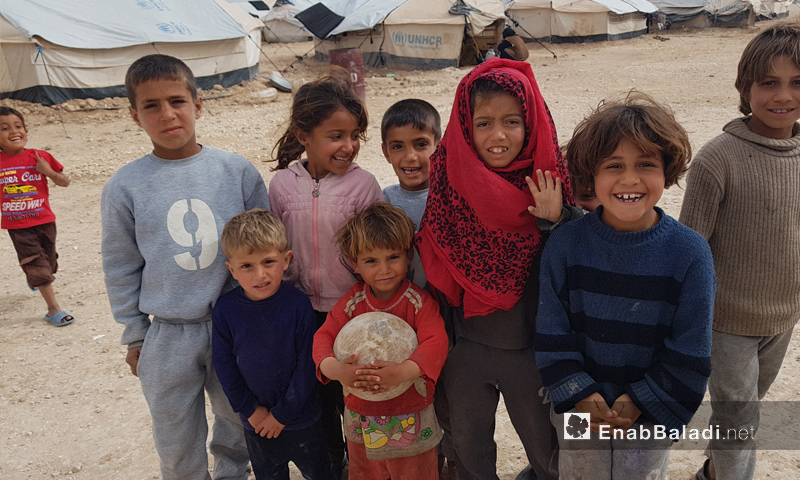



The local organizations in Hasakah governorate are implementing projects, the target of which are the displaced people in the camps’ area, with the aim to solve their problems, on top of which is securing water that for a long time posed itself as a major source of suffering for people.
“Bahar” Charity Organization (Spring) has launched a project to be completed at the end of March; the project’s central idea is providing water for more than the half of the “Arisha” Camp’s residents, according to what the project’s Director Mohammad Ahmad has told Enab Baladi, in addition to clearing rubbish off.
According to Ahmad, the Organization brings water in tanks to fill storages which it constructed in the Camp, at the beginning of the project, on December.18.2017; he also explained that all the projects are implemented in coordination with the camps’ managements and the area’s United Nations High Commissioner for Refugees.
The organization distributes hygiene baskets to all the families in the camp; it follows the same strategy in other two camps, “al-Mabroukah” and “Abu Khashab,” according to the Project’s Director, who pointed out that “Bahar” sponsors the operation of the “Shara” Station, which supplies “al-Mabroukah” and other seven surrounding towns with water.
Hassna al-Ali, a displaced woman from Deir ez-Zor to the “Arisha” camp, told Enab Baladi that the water project is one of “the best projects that are implemented in the camp, for the water’s distribution ratios are good and the water is clean.”
“We used to walk long distances to get water, and we suffered a lot due to this,” Hassna added, pointing out that what the camp’s families and she lack lies in the need to guarantee the children, especially the children of widows, “who are living in pain to make a living for the family and to provide basic needs,” according to her description.
Alyia Hussain, a displaced woman in the same camp, described the process of getting water “as a massive crisis, which we started suffering upon arriving at the camp,” explaining that, “the observers check the water and examine it before filling the special storages; this is reassuring.”
The displaced woman also hinted at the shortage of job opportunities within the camp, pointing out that “my sons continue to live in the camp without a job, for the camp’s management does not allow more than one person in the same tent to work, but we need a lot of money.”
“Bahar” refers to itself as a non-profit independent charitable foundation that contributes to providing humanitarian aid as a part of the general efforts seeking to develop society.
Thousands of internally displaced people live in the following camps: “Al-Bahrah (Arisha), al-Sad, al-Holl, al-Mabroukah,” while others live in compounds, such as “Abu Khashab, al-Rayan and Kherbat al-Tamer.” Some of these people complained to Enab Baladi of negligence, calling for a rapid movement to change their conditions to a better state.
if you think the article contain wrong information or you have additional details Send Correction